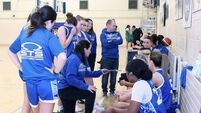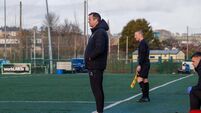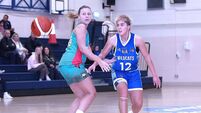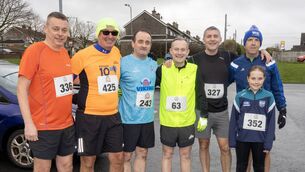David McGlynn reflects on Dublin Victory
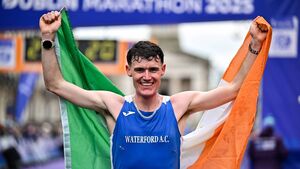
David McGlynn of Waterford AC crosses the finish line to win the men's national title at the 2025 Irish Life Dublin Marathon. Photo: Sportsfile/Sam Barnes
“Years of miles, sacrifice and delusion masked as belief” was David McGlynn’s summary of his athletic career up until the Dublin City Marathon.
Somewhere along the road, around the 18th mile of the marathon to be exact, any delusions about his ability, or ultimate potential in the sport, began to wipe away in the gentle drizzle of that overcast Sunday afternoon.
After spending much of the race adrift from the leading Irish pack, McGlynn found himself shoulder to shoulder with defending champion and former national record holder Hiko Tonosa.
After a few minutes of going stride-for-stride with Tonosa, McGlynn pulled clear. He was now downing upon inner-city Dublin, clear of all other Irishmen.
McGlynn shattered his personal best in a time of two hours and eleven minutes. The result marks him as the tenth fastest Irishman of all time. Not since John Treacy in 1993 has Waterford had a male marathon champion.
“You're always kind of chasing that day in the sun and to have a breakthrough performance in your own country with all your friends, family and loved ones around you… It’s a career-defining day,” McGlynn reflects.
“The Irish all-time list, going tenth on that, and being surrounded by names that probably would have run a lot quicker if they had the same shoe technology and fuelling strategies that I have…To be in that kind of that realm is really something special.”
For McGlynn, the victory has yet to truly sink in. He had initially only targeted the podium and was the fourth fastest Irishman on paper before the start gun fired.
He has since been inundated with messages, interview requests, and corporate gigs- he spoke to the News & Star at a photoshoot in conjunction with Waterford A.C. and his employer, Ernst & Young.
McGlynn led Waterford A.C. to the senior men’s team title, followed by clubmates Pat Fitzgerald (2:28) and Noel Murphy (2:30).
“The journey of not really being a household name and putting in years of work, I think maybe it resonates with people,” McGlynn says while speaking about the droves of then-unknowns who congratulated him in the wake of his victory.
“I'm looking forward to it calming down a bit and getting to spend time with the people close to me and really start to soak it up properly. I'm sure it will take a few weeks to sink in, but once it does, I'm sure I'll appreciate what I achieved.”
In reflection, McGlynn says the race played out in an almost poetic manner.
Initial videos in Castleknock, the seven-mile mark of the marathon, show the lead pack running at breakneck pace (American Daniel Mesfin won the international race in two hours and eight minutes.) Even as the video continues to roll, McGlynn’s nowhere to be seen.
His halfway split of 64:58, which had largely been run solo, was quick. It served as an indication that those ahead of him were set to suffer.
McGlynn had spent the last six months living in Clonskeagh, Dublin, while working with EY. It was there he launched his assault past Tonosa to take the lead in the national race. It was there he had logged hundreds of lonely miles with visions of winning Dublin replaying constantly in his mind.
“Being out in front, especially with six months to go in the marathon, can be a very lonely and anxious kind of place.
“You don't know if you're going to totally blow up, and then if you blow up, do you have enough of a lead that you can still hold them off.
“I've been visualising Dublin marathon for months and visualising Clonskeagh…I don't even know why I thought that there was going to be a group of Irish together at that stage in the marathon. I don't know where that thought came from, but I've just been thinking about that for months.
“I’ve been telling myself for months, I just said, ‘just run as hard as you can to the top of Fosters Avenue, and then the course gets more forgiving from there.’ So that's exactly what I did. I got to the bottom, and I just put my head down.
“I knew my girlfriend was going to be at UCD, so I had been looking forward to that for a few miles…The great thing about Dublin is that when you have loved ones on the course, and your friends and family around the place, that you get those little boosts.
“I knew that Sarah was somewhere along the road at UCD, and then you kind of come up to her, you hear her shouting at you, like a few of my close friends were shouting at me along there, and that really spurs me on. And it makes it easy to kind of just put your head down and forget about where you are.
“The name of the game is putting one foot in front of the other.”
The win places McGlynn on a clear path towards an international debut over the marathon. The automatic qualifying standard for next year’s European Championships is 2:09:30, but through European Athletics’ point ranking system (an alternative backdoor for athletes who don’t run the standard), McGlynn sits comfortably in the qualifying quota.
Irish marathon running is in a rich vein of form, and the bar has been raised. Over the past twelve months, the national record has passed through three different hands. Most recently, Youghal’s Ferghal Curtin ran two hours and seven minutes in South Korea.
“This time last year, I would have thought 2:14 is a really fast marathon…and then an Irish person runs 2:07 and it's like if I want to compete even on a national level, I have to be running 2:10, 2:09.”
He recalls lunching with his friend, Irish international athlete Darragh McElhinney. “Darragh just turned to me and was just like, ‘Why the f*ck can't you run 2:06 in three years time?’ So, that's kind of always the way we think, is that there's always more.”
For now though, he’s appreciating what he has in the present. As he looks towards another major race in the Spring, and a possible return to the unrelenting mud of Irish cross country, the possibility of a professional sports sponsorship lingers in the back of the mind.
McGlynn insists the key is to stay grounded.
“The dream is to be a professional athlete, to have all these kinds of extras that might come with potential sponsorships.
“It also is important not to take for granted the kind of support systems I have in place and what the people in my life do for me.
“I still believe that I can improve, and I still believe I have the right things around me to facilitate me training at a high level and competing at a high level, and I hope to be able to do it for a very long time.”
